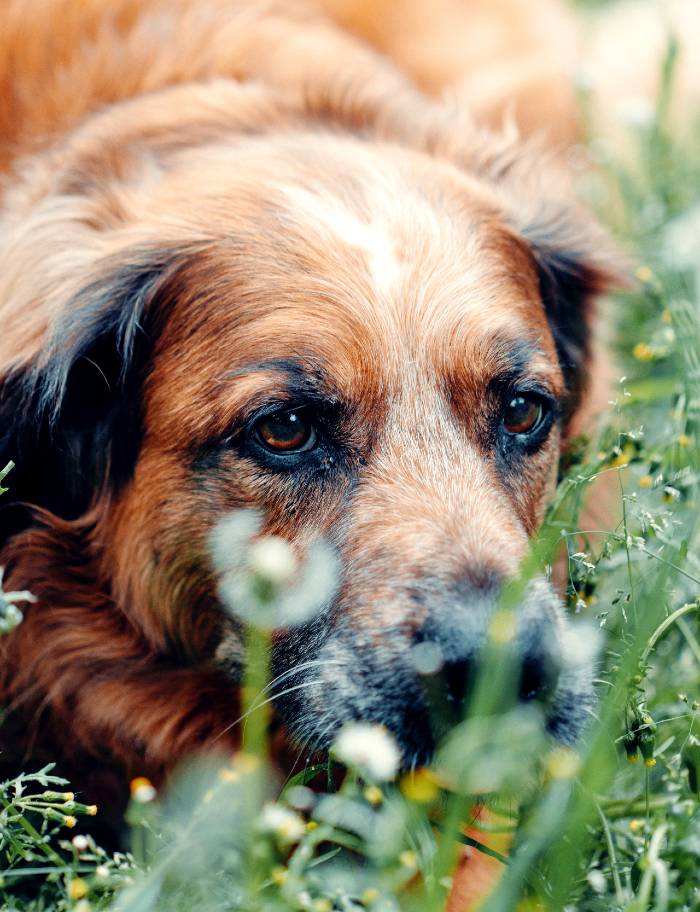Two acids, one abbreviation. Alpha-lipoic acid and alpha-linolenic acid may be a mouthful, but you don’t want to get them confused. While both ALAs play their part in keeping our pets leaping and bounding, one is likened to the fountain of youth, encouraging mental sharpness well into the senior years.

On The Agenda
What is ALA?
We’re here for Alpha lipoic acid, the antioxidant. Alpha-linolenic acid, the Omega, comes from plant-based sources and isn’t as readily available to your dog because the form has to be converted to the active EPA and DHA– meaning your dog only gets some benefit from ALA Omega 3s. We recommend sticking with the best and brightest Omega 3s– EPA & DHA.
ALA, the antioxidant getting all the press, and for good reason, is naturally manufactured in the mitochondria where its main job is to turn glucose (or food) into energy. This antioxidant’s other skill set is fighting free radicals, the waste products produced as the body turns that food into energy. While all antioxidants do this, it’s where ALA can go and what it does for fellow antioxidants that have everyone buzzing about its potential for four-leggers and two-leggers alike.

Where Does ALA Come From?
Alpha-lipoic acid is endogenous, or present in every cell of the body. Plus, exogenous, or gotten through external sources, namely diet. It can be found in superfoods like spinach, broccoli, cow heart, and kidney.
Red meats, particularly muscle meats and organ meats, contain the richest concentrations of alpha-lipoic acid. It’s also available as an ingredient in formulas designed specifically for the aging brain.
What Are Its Superpowers?
As the prospective “Fountain of Youth,” it lives up to its nickname in significant ways.
It Scavenges Free Radicals Everywhere

Free radicals are responsible for many of the negative effects of aging, including cognitive decline. Antioxidants like ALA clean up free radicals that cause oxidative stress. (If that term’s unfamiliar, read this.)
While other free-radical fighting antioxidants are restricted to water (Vitamin C) or fatty tissue (Vitamin E), ALA is considered the “universal antioxidant” because it works in either.
ALA is one of the very few antioxidants that can benefit every single part of the body, including the brain.
Using that superpower, ALA can cross the blood-brain barrier to eliminate free radicals everywhere before they can cause damage in cells, tissues, or organs like the brain.
It Brings Out the Best In Other Antioxidants
When ALA is present, other antioxidants are regenerated and enhanced, multiplying their ability to fight free radicals.
So, ALA doesn’t just fight free radicals itself. It makes all of its allied antioxidants stronger and more resilient. Superpowered, we know. ALA even stimulates production of the powerful antioxidant glutathione, offering yet another defense mechanism to brain cells.

It Works Well & Fast
Alpha-lipoic acid is easy for a dog’s body to absorb, and it works quickly. A team of researchers noted improved cognition in a group of senior dogs in a matter of days to weeks, depending on the dog, including learning things faster.
How Dr. Bessent Uses ALA
While nothing can stop aging, nutraceuticals like alpha-lipoic acid can help to make your dog’s later years more vibrant.
Dr. Bessent recommends every dog use targeted nutraceuticals like ALA proactively since a dog’s antioxidant needs become increasingly crucial as they age.
To Nourish the Aging Brain

When dogs are young, they’re healthy and vibrant because their endogenous antioxidant production is at its highest. With age, your dog’s body produces fewer and fewer antioxidants, and that’s when those graying muzzles creep in.
That’s why you shouldn’t wait until your dog gets older to add antioxidants to the bowl. Daily antioxidants support your pup’s body when endogenous production is depleting. Then adding targeted nutraceuticals like ALA on top of those daily antioxidants around the last third of their lives will focus on nourishing the brain.
For those extra-large breeds like Great Danes, that may be around 5 or 6 years old, whereas teacup breeds of the world may be in their teens.
To Ease CDS Symptoms
Research has shown us that nourishing the brain with nutraceuticals like ALA, may even help slow cognitive dysfunction and the symptoms in dogs– confusion, changes to their sleep/wake cycles, house-soiling, restlessness.
It’s just about starting now.
Dr. Bessent recommends using targeted nutraceuticals alongside a daily routine to protect cognitive function and manage those symptoms for more good days.

Like all nutraceuticals, alpha-lipoic acid works best when complemented with other brain-boosting ingredients. That’s why Dr. Bessent utilizes ingredients like DHA and ginkgo Biloba in combination with ALA. While this superpowered antioxidant plays an integral part in safeguarding cognitive function and brain health, it is one part of a comprehensive blend of targeted nutraceuticals that feeds the mind of our aging pups.
Share this Post

Dr. Chris Besent
Chris Bessent, DVM, MSOM, Dipl. OM, L.Ac. has over thirty years of experience in veterinary medicine including certificates in veterinary acupuncture, veterinary chiropractic and veterinary Chinese herbology. Imbued with Eastern philosophy and the knowledge that food is the foundation of health, Dr. Bessent also received her degree in veterinary nutrition and began to formulate recipes fit for a carnivore from nothing but whole foods. Currently, she divides her time between the Simple Food Project and Herbsmith, both of which are owned and operated out of her facilities in southeastern Wisconsin.

Kayla Behling - Editor
Kayla is the Content Editor for Herbsmith. She has a cat named Professor Cat-Faced Meowmers, who goes by Kitty, and a goof of a dog, named Duck. She stays busy biking trails, playing board games, and searching for the next best craft beer.




